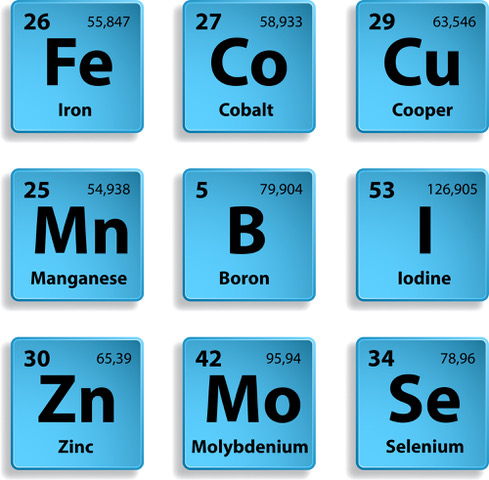Why Protein Does Not Help Hair Nails and Skin
Let’s talk about how to reverse hair loss, strengthen nails, and restore collagen production. The short version? When you have any of these problems, you are dealing with a protein deficiency - but they cannot be fixed by simply consuming more protein. Instead, you have to start by adding more trace minerals and vegetables to your diet.
Here’s why.
In this article:
- What Causes These Issues?
- Popular Solutions That May Not Work
- The Real Solution: Trace Minerals
- How to Get Enough Trace Minerals
- Other Things that Can Help
What Causes These Issues?
People often say that hair loss, bad skin, and brittle nails are a “natural” part of the aging process. That said, these issues can also be linked to very unnatural sources like:
- Cosmetic processes, like chemical hair processes and artificial nails
- Serious medical problems, like thyroid disease (hypothyroidism), eating disorders, or biotin deficiency.
More often than not, though, the problem is linked to protein synthesis, or the body’s ability to create and use protein.
Popular Solutions That May Not Work
Ok. So the issue is somehow linked to proteins. The solution, then, is to supplement with extra protein, right? Well, that's what many people think - which is why you see a lot of people turn to things like biotin, collagen powder, and protein powders.
So what exactly are they consuming here? Let's take a look:
- Biotin: This is one of the B complex vitamins that help the body convert food into energy. It’s particularly responsible for keeping your skin, hair, eyes, liver, and nervous system healthy. Biotin can be found naturally in egg yolk, organ meats, nut butter, soybeans, cauliflower, bananas, and mushrooms. Most people are not deficient. That said, there are plenty of biotin supplements on the market that aim specifically to help strengthen skin and hair.
- Collagen: Collagen is the most abundant protein in the human body. It has many important roles in the human system, helping to clot blood and to provide structure to the skin. It’s also one of the major building blocks of bones, skin, muscles, tendons, and ligaments.
- Protein powder: Proteins, in general, are essential macronutrients that help build muscle, repair tissues, and make enzymes and hormones. People consume various protein powders - including whey, casein, and hemp protein - to grow muscles, aid in exercise recovery, add to their nutrition, etc.
- Keratin: Keratin is the actual protein that makes up your hair, skin, and nails. So, naturally, many people add more keratin to their diet or hair products if they're dealing with any issues.
Alternatively, people turn to other supplements like vitamin C, vitamin A, amino acids, and omega-3 fatty acids. These nutrients are also essential to protein synthesis or proper cellular function.
- Vitamin C: This vitamin is needed for the growth and repair of tissues all over the body.
- Vitamin A: This helps form and maintains healthy teeth, skeletal and soft tissue, mucous membranes, and skin.
- Amino acids: These are the building blocks of proteins in the body.
- Omega-3s: These fatty acids are an important part of cell membranes, and they affect the function of cell receptors in the body.
Sounds like great stuff, right? Well, yes it is. Which is why so many people add as much of these ingredients to their diet as possible in order to combat things like brittle nails or lackluster hair.
The problem with this approach? It’s not that we’re not getting enough biotin or vitamin C, it’s that our bodies are not equipped to actually use the proteins that we’re consuming. Which means that, even if you consume buckets of this stuff a day, the vast majority of it is going straight through your body and out in your waste. It’s not going to be used by your body in any beneficial way.
That’s why the actual solution is to add more trace minerals.
The Real Solution: Trace Minerals

What are trace minerals?
Trace minerals, at their most basic, are minerals required in very small amounts in the body - usually less than 100mg.
Now, we’re not talking about minerals like calcium, magnesium, potassium - these are essential minerals that the body needs in more significant doses throughout the day.
Instead, we’re talking about things like selenium, manganese, and zinc that are needed in tiny amounts in the body.
What role do they play?
Trace minerals act as cofactors, which are essentially helper nutrients for the body. They play a role in over 600 biochemical reactions with enzymes. The enzymes are the things that help you build things up in your body - or the workforce - and they’re built with trace minerals. So each enzyme has its own trace mineral (or minerals) that it uses to make it work.
This is absolutely essential for protein synthesis - or the production of protein. Enzymes are protein catalysts - which, in simple terms, means that they build proteins - and they need these trace minerals to function.
In this way, adding trace minerals can be thought of like plugging the power cord into the wall - if you don't do it, the device simply won't work. So it's pretty huge.
The Problem: Trace Minerals are Missing From Our Soil
The next question, then, is how to make sure you're getting enough of these minerals. Normally, you can get these minerals in the soil.
Now, this doesn't mean that you should go out and eat a bunch of dirt - your body doesn’t absorb rocks too well (obviously). Instead, you have to make sure to eat your greens. We absorb plant-based minerals. Plant-based minerals are 15,000 times smaller than salt or rock minerals. The plant actually takes the rock, breaks it down, and absorbs the minerals that it contains. This makes it easy for us to assimilate.
That’s why we want to get our nutrients - especially those from the mineral family - from our plants.
In America, though, we’re missing the trace minerals.
That’s why we see young kids coming out with bad teeth, bad dental structure, and other structural issues. In Africa, where the soils are rich, you don't see these same problems so frequently. And it all comes down to the soil and the trace minerals.
How to Get Enough Trace Minerals: Dietary Changes
Incorporate Trace Minerals
One of the products that I use is plant-based trace minerals. These minerals come from soil that's 70 million years old - back from when the soils were really rich. There’s a company I use that liquefies these minerals and makes them 15,000 times smaller so they’re very easy to absorb. You take one dropperful a day, and you just need a little bit to kick in these enzymes and allow the hair, nails, and skin to grow back.
Consume More Vegetables

The other thing you’re going to need to do is to consume more vegetables. You’re going to need about 7-10 cups of salad per day (not iceberg, but nutrient-dense salad) to be able to fortify and give you more minerals in your diet.
The drops are kind of an enhancement for the trace mineral part, not just the regular minerals.
In summary, if you have hair, skin, nail, or collagen problems, don’t eat more protein! Look at the underlying cause and add more trace minerals and eat more vegetables. That’ll give your body the foundation it needs to build healthy proteins.
Other Things Can Help Too
Be Aware of How You Treat Your Body
Do you bite your nails, dye your hair, or use damaging hair products or styles? Consider your day-to-day activities and make a concerted effort to cut down on habits or products that might be doing major damage. Some great places to start:
- Baby your hair: If you regularly blow-dry or flat-iron your hair, you're probably going to see thinning no matter what. Try cutting this down at least one time a week - and maybe even add in a nourishing hair treatment - to start undoing the damage.
- Moisturize skin: If your skin is consistently dry, irritated, or flaky, chances are that you’re engaging in activities or using products that break down your skin's natural barrier and make it more prone to wrinkles, infection, and other major problems. This is especially common today, where even many skincare products are harsh and overly stripping on the skin. The solution? Skip the scrubs and harsh chemicals and opt for oil-rich, barrier-building serums and face oils for healthy skin.
- Give your nails a break: Bite your nails, use harsh nail varnish, or work with harsh chemicals? Try to keep them trimmed and skip the polish to reverse brittle nails and restore their natural health.
- Slather on the SPF: Exposure to UV rays can be a major skin and hair sabotager, leading to dry hair, increased wrinkles, skin sagging, and poor skin health. Use a broad-spectrum sunscreen - and at least SPF 30 - to combat these problems on a day-to-day basis.
- Get your antioxidants: One of the biggest environmental problems that everyone deals with - particularly if you live in an urban environment - is pollution and related free radical damage. These can attack cells and lead to major damage, causing wrinkles, compromised cell structure, and more. Incorporate antioxidants into your diet and your skincare routine to combat free radical damage and protect the skin from this assault.
Up Next:
Disclaimer: Our educational content is not meant or intended for medical advice or treatment.
Editor’s Note: This post has been updated for quality and relevancy.
Previous blog
The Top Symptoms of a Magnesium DeficiencyNext blog
The Importance of Hydrochloric AcidTags

Popular
08/21/2024
54.3K views
02/23/2025
45.8K views
11/18/2024
273.7K views
03/18/2024
11/21/2022




